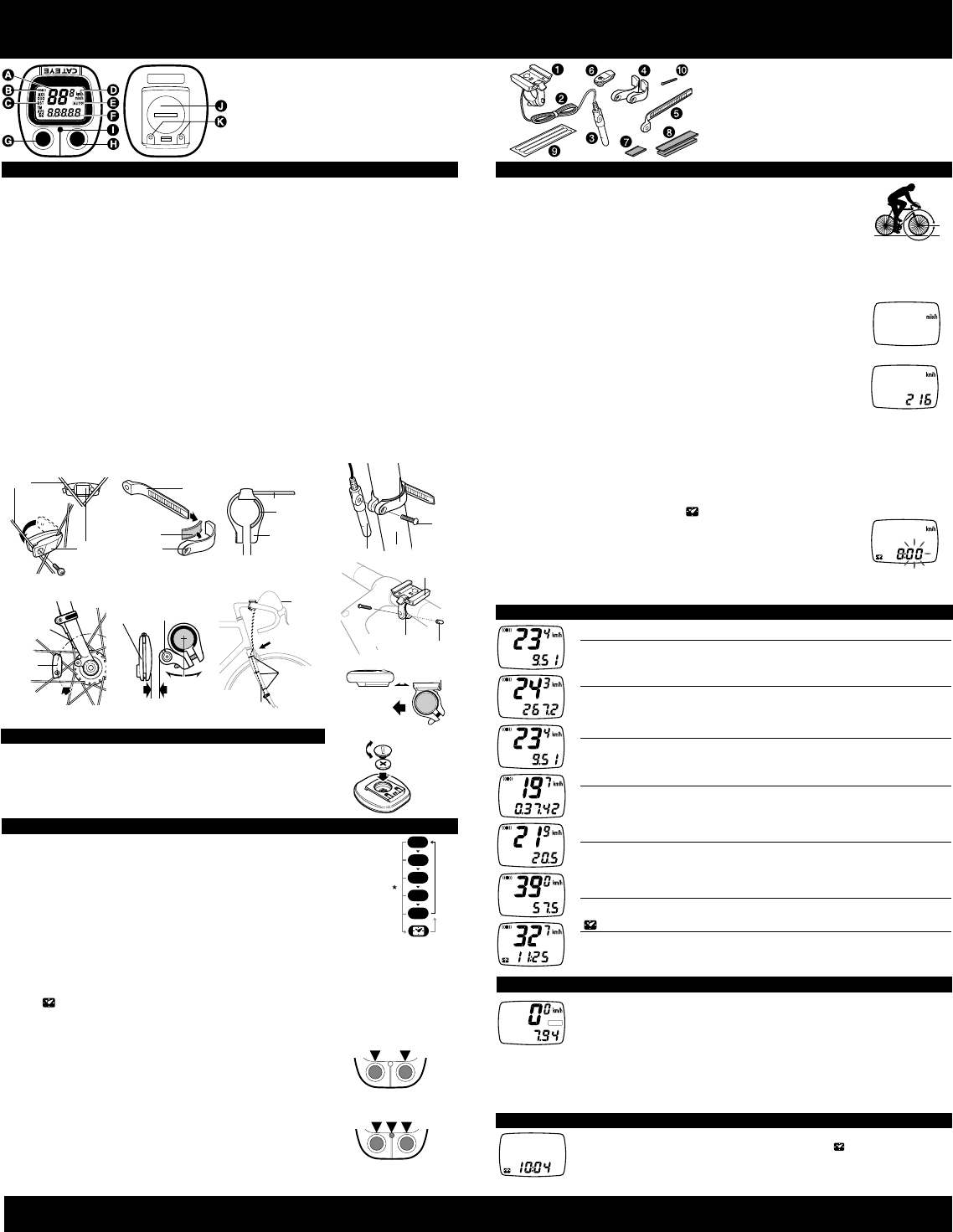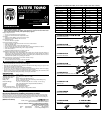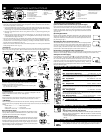
C
A
T
E
Y
E
MEASURING AND DISPLAY FUNCTIONS
OPERATING INSTRUCTIONS
E
SPD Current Speed
0.0(3.0) - 65 mile/h(27inch) ±1 mile/h under31 miles/h
This is always displayed on the main display and updated once a second.
ODO Total Distance (Odometer) 0.0 - 9999.9 mile ±0.1 mile
This is continuously measured until battery wears down or all clear operation is
done. At 10,000 miles(km), it returns to zero and counting begins anew.
DST Trip Distance 0.00 - 999.99 mile ±0.01 mile
The trip distance from start to current point is displayed. With Reset operation, it
returns to zero.
TM Elapsed Time 0:00'00" - 9:59'59" ±0.003 %
Elapsed time is measured from start to current point, in units of hours, minutes and
seconds. At 10 hours, it returns to zero and counting begins anew. With Reset
operation, it returns to zero.
AVS Average Speed 0.0 - 65.0mile/h ±0.3 mile/h
The average speed from start to current point is displayed within 27 hours 46
minutes 39 seconds (99,999 seconds) or 999.99 miles (km). If either is exceeded,
(.E) is displayed and calculation ceases.
MXS Maximum Speed 0.0(3.0) - 65 mile/h(27inch) ±1 mile/h
With Reset operation, it returns to zero and counting begins anew.
12-hour clock time 0:00' - 11:59' ±0.003 %
The current time is displayed by a 12-hour clock.
DST
ODO
DST
TM
AVS
MXS
This function switches the main unit to start or stop automatically, in which AUTO
symbol appears on the screen, and you are free from pressing S/S button each
time.
•How to switch on/off the Auto Function.
In TM, DST or AVS, this function switches on/off with each press of SET button.
When on, AUTO symbol appears. *With this function, it ceases measuring
elapsed time during a stop.
* 2 seconds may be elapsed if mount the main unit to the bracket with this func-
tion on.
AUTO
DST
POWER SAVING FUNCTION
A. Main Display (Speed)
B. Sensor Pulse Symbol
C. Mode Symbol
D. Speed Scale Symbol
E. Auto Mode Symbol
F. Sub-Display (Selected Function)
G. M (Mode) Button
H. S/S (Start/Stop) Button
I. Set Button
J. Battery Case Cover
K. Contact
1. Bracket
2. Wire
3. Sensor
4. Sensor Bands-A (S)(L)
5. Sensor Bands-B
6. Magnet
7.
Sensor Band Rubber Pad
When main unit is left without receiving any signal for 60-70 minutes continuously,
power supply is shut down and main unit will display ( ) only as the figure. By
pressing M button or S/S button, or by receiving signal, this function is released.
AUTO (AUTOMATIC START/STOP) FUNCTION
BUTTON FUNCTION
• M button (Fig.1)
Changes the display in the order shown in fig. 1, and data is displayed on the sub-
display. *If held over 2 seconds, 12-hour clock appears.
• S/S button
Starts and stops the measurement of trip distance and elapsed time. During op-
eration, speed scale symbol flashes. In Auto Function, this button is invalid.
• SET Button
This is for setting the wheel circumference and clock time, switching on/off Auto Function and to clear
all present data and any irregularity. When pressed in stop state in each mode, the following can be
revised.
• In ODO mode ---------------------Wheel circumference
• In mode-----------------------12-hour clock
• In TM, DST or AVS mode -----On/off the Auto function
Reset Operation: (Fig.2)
Select any mode except ODO, then press M button and S/S button simulta-
neously. MXS, AVS, DST and TM will become zero. (When done in ODO,
registered wheel circumference will be displayed.)
All Clear Operation: (Fig.3)
When M button, S/S and set buttons are pressed simultaneously, all data
stored (ODO, speed scale, Wheel circumference and clock time) is erased.
All displays illuminate, then mile/h symbol illuminates. This should only be
executed after replacing battery or when irregular display occurs due to
static electricity, etc. Since all memories are erased, set necessary data
again according to "Main Unit Preparation".
Fig.6
Fig.7
Fig.5
MAIN UNIT PREPARATION
The following must be completed before operating.
(1) How to measure wheel circumference (L) of your bike (Fig.4)
Put a mark on the tire tread and ride the bike one full wheel revolution. Mark the
start and the end of the revolution on the ground and then measure the distance
between the two marks. This is your actual circumference. Or, the "Selecting
Values Cross Reference Table" tells you an approximate circumference accord-
ing to tire size.
(2) Setting Speed Scale
Preform all clear operation. All displays will illuminate. Then mile/h alone will be
displayed as illustrated in fig.5. Km/h and mile/h are alternately displayed with
each press of S/S button. Press M button to set desired speed scale. The dis-
play will change as fig. 6.
(3) Setting the wheel circumference (Fig.6)
The standard wheel circumference of 216 cm for 27" wheel is displayed. When
using 216 cm without revision, press M button. ODO will be displayed and 216
cm is set. For revision, press S/S button to increase the number by one. To
increase rapidly, hold down the button. When the desired number appears,
press M button. ODO will be displayed, and the desired number is set.
(4) Resetting or changing the wheel circumference
Set main unit in ODO with M button, and stop it with S/S button. Press SET button. The stored number
will flicker on the sub-display. Revise the number as desired according to the instructions in (3).
Setting the clock time (Fig.7)
Press M button over 2 seconds to select , and stop it with S/S button. Then
press SET button, and minutes flash. Press S/S button to advance minutes by
one. To advance rapidly, hold down the button. Set the time one or two minutes
ahead of the current time. Then press M button, and hours will flash. Use S/S
button the same way. Press SET button to complete time setting. *When you
press the SET button, the undisplayed seconds will turn to zero. For accuracy,
set by the radio time signal.
HOW TO REPLACE THE BATTERY
Turn main unit over, remove battery case cover with coin and insert a
new lithium battery properly (CR1620 or CR1616) with the (+) pole up-
ward (fig.17), and close the cover securely.
* Please make sure to do the All Clear operation after replacing bat-
tery, and to set the unit again.
8. Bracket Rubber Pad (2 pcs.)
9. Wire Securing Tape
10. Sensor Band Screw
MOUNTING TO BIKE
• The spokes must run correctly through the inside the magnet as in fig.8.
• Attach the sensor with Sensor Bands-A-B to the right fork. Choose a band that fits the fork diam-
eter (S size for up to 24ø, L for oversize).
1. Insert the band-B into the slit of the band-A, and put the rubber pad inside of the band-A(fig. 9).
Adjust the length in order that the screw-fastening part of the bands are parallel when mounted
to the fork(fig. 10). *To pull out the band B from band A, tug strongly.
2. Mount the adjusted bands to the fork along with the sensor, by temporarily tightening the
screw(fig. 11).
3. Align the magnet's center and the sensor's marking line(fig. 12), and make sure of 2mm clear-
ance between the magnet and sensor (fig. 13). Then tighten the screw securely. Cut the excess
of the band-B with a nipper or the like.
• Secure the wire with tape as fig. 14. Wind the wire round the outer cable and adjust length. Loosen
the wire in the area marked with the arrow so that the wire does not hinder handlebar operation.
• Use either 1mm- or 2 mm-thick pads if necessary, according to handlebar diameter. Attach the
bracket close to the handlebar stem (fig. 15).
• Slide main unit onto the bracket from front until it clicks into position. To remove, pull it off forward
while pushing down the lever. (fig. 16)
•Test (Fig.16)
Mount main unit. If main display does not show any figures, press either M button or S/S button to
release from power saving function. Spin the wheel to check if sensor pulse symbol flashes. If not,
adjust relative positions of magnet and sensor following the instructions.
magnet
sporkes
Fig.8
sensor
band B
sensor
band A
Fig.9
rubber pad
Fig.10
rubber pad
sensor band B
sensor band A
parallel
Fig.11
sensor band A
screw
sensor
fork
Fig.12
markingline
of sensor
center of
magnet
magnet
sensor
Fig.13
about 2mm
wire securing
tape
Fig.14
outer cable
wire
bracket
screw cap
Fig.15
rubber pad
lever
Fig.16OPEN
CLOSE
Fig.17
Fig.2
RESET
Fig.3
ALL CLEAR
MXS
ODO
DST
TM
AVS
Fig.1
L
Fig.4




